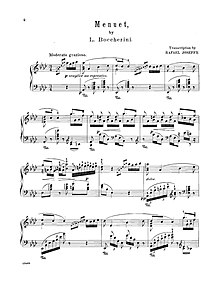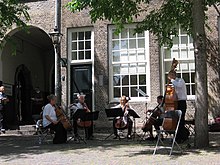String quintet
A string quintet is a musical composition for five string players. As an extension to the string quartet (two violins, a viola, and a cello), a string quintet includes a fifth string instrument, usually a second viola (a so-called "viola quintet") or a second cello (a "cello quintet"), or occasionally a double bass.
Notable examples of classic "viola quintets", in four movement form include those of Wolfgang Amadeus Mozart. Other examples were written by composers including Johannes Brahms and Felix Mendelssohn.
A famous "cello quintet" is Franz Schubert's Quintet in C major. Antonín Dvořák's Quintet Op. 77 uses a double bass, and Mozart's famous Eine kleine Nachtmusik may be performed with this instrumentation (the double bass being optional).
Alternative additions include clarinet or piano (see clarinet quintet, piano quintet); and other closely related chamber music genres include the string quartet (much more common), the string trio, and the string sextet. A more unusual form of string quintet is the violin quintet composed of 3 violins, a viola and a cello (thus a string quartet with an additional violin).
The term string quintet may refer to a group of five players that performs such works. The ensemble was standard in 17th century Italy and can be seen as early as 1607 in Claudio Monteverdi's opera, L'Orfeo.[1]
List of viola quintets
- Johann Georg Albrechtsberger – 19 String Quintets called "Sonatas" (1782–1803)
- Franz Joseph Aumann – String Quintet "Divertimento" in C major (c.1760)
- Arnold Bax – Quintet (1933)[2]
- Frank Bridge – Quintet in E minor (H15, 1901)
- Ludwig van Beethoven – Quintet, Op. 29, sometimes called the Storm Quintet; a Fugue in D major for viola quintet, Op. 137; an arrangement of his Octet for Viola Quintet, Op. 4 (the original Octet was later published as Op.103); an arrangement of his Piano Trio Op. 1 No. 3 for Viola Quintet, Op. 104
- Luigi Boccherini – twelve original Quintets, arrangements of all twelve of his Piano Quintets (Op.56 and Op.57) for Viola Quintet.
- Johannes Brahms – two Quintets, Op. 88 and Op. 111; the first edition of the Clarinet Quintet Op. 115 included an alternate part for viola substituting for the clarinet
- Max Bruch – Quintet in A minor
- Anton Bruckner – String Quintet in F major (1879); Intermezzo in D minor (substitute for the scherzo)
- Carson Cooman – Quintet (Unquiet Parables, 2009), Op 856[3]
- Brett Dean – Epitaph for string quintet (2010)
- Antonín Dvořák – two Quintets, No. 1 in A minor and No. 3 in E♭ (the American Quintet)
- Victor Ewald – a Quintet Op. 4 in A major[4][5]
- Eduard Franck – two Quintets, Op. 15 in E minor and Op. 51 in C Major
- Florian Leopold Gassmann – Op. 2 six String Quintets H 501–506 (1772)
- Friedrich Gernsheim – Quintet Op. 9 in D
- Roy Harris – Quintet (1940)
- Franz Joseph Haydn – Hob.II:2 Divertimento in G major (c.1754)
- Heinrich von Herzogenberg – Quintet in C minor, Op.77 (1892)
- Franz Anton Hoffmeister Op. 2 six Quintets (c.1782)
- Klaus Huber – Ecce homines (1998)
- Heinrich Kaminski – Quintet in F♯ minor (two versions, first 1916)[6]
- Franz Krommer – fifteen String Quintets
- Johann Michael Malzat six String Quintets in F,G,B,A,E♭,C major
- Bohuslav Martinů – Quintet (1927)
- Felix Mendelssohn – two Quintets: No. 1 in A major, Op. 18 (1826, revised 1832) and No. 2 in B-flat major, Op.87 (1845)
- Ernst Mielck – Quintet in F major (1897)
- Darius Milhaud – Quintet Op. 325 (1953–1954)
- Wolfgang Amadeus Mozart – six Quintets: K174, K406/516b, K515, K516, K593, K614
- Carl Nielsen – Quintet in G major (1888)
- George Onslow – five out of his thirty-four Quintets are with two violas; four are with double bass and the rest with two cellos (see below)[7]
- Hubert Parry – Quintet in E flat (1909[8])
- George Perle – Quintet (1958)
- Josef Rheinberger – Quintet in A minor, Op. 82 (1874)[9] (Carus-Verlag)
- Ferdinand Ries – Seven Quintets, Op. 37 in C, Op. 68 in D minor, Op. 167 in A minor, Op. 171 in G, Op. 183 in E-flat, and two published without opus in A major and F minor (published in a series "Samtliche Streichquintette" edited by Jürgen Schmidt between 2003-5 for Accolade Musikverlag.)
- Franz Schubert – "Quintet-Overture" for Quintet, D 8
- Roger Sessions – Quintet (1958)
- Robert Simpson – Quintet (1987)
- Louis Spohr – seven Quintets
- Charles Villiers Stanford – Two Quintets, Op. 85 & Op.86 [10]
- Johan Svendsen – Quintet in C, Op. 5[11] (1868)
- Sergei Taneyev – Quintet in C, Op. 16
- Johann Baptist Wanhal – Six String Quintets (1774)
- Ralph Vaughan Williams – Quintet (the Phantasy Quintet – 1912) and Nocturne and Scherzo (1904–1906)
- Felix Weingartner – Quintet, his Op. 40
- Ermanno Wolf-Ferrari - Quintet in C, Op. 24 (1939)
- John Woolrich – The Death of King Renaud (1991)
- Alexander von Zemlinsky – Quintet (1894–1896): 2 movements are lost
List of cello quintets

- Arnold Bax – Quintet in G major (1908), the second movement of which was rescored by the composer for Viola Quintet and published as the Lyrical Interlude (1923);
- Wilhelm Berger – Quintet in E minor, Op. 75 (1911)[12]
- Luigi Boccherini – one hundred and ten Quintets. The third movement Minuet of the Cello Quintet Op.11 No.5 is extremely well known.
- Alexander Borodin – Quintet in F minor (1859–1860)
- Luigi Cherubini – Quintet in E minor (1837)
- Felix Otto Dessoff – Quintet, Op. 10
- Friedrich Dotzauer – Quintet in D minor, Op. 134 (1835)
- Felix Draeseke – Quintet in F, Op. 77 (1901)
- Friedrich Gernsheim – Quintet Op. 89 in E♭
- Alexander Glazunov – Quintet in A, Op. 39 (1892)
- Karl Goldmark – Quintet in A minor, Op. 9 (1862)
- Theodore Gouvy – Quintet in G, op 55 is on IMSLP
- August Klughardt – Quintet in G minor, Op. 62 (1902)[12]
- Frank Martin – Pavane couleur du temps (Colour of weather Pavane), 1920, 7', For quintet.[13]
- Darius Milhaud – Quintet Op. 350 (1956)
- George Onslow – twenty-five of his thirty-four string quintets are Cello Quintets; five are with two violas and four are with double bass[7]
- Einojuhani Rautavaara – Quintet "Les Cieux Inconnues" (Unknown Heavens, 1997)
- Ottorino Respighi – Quintet in G minor (1901, incomplete)
- Wolfgang Rihm – Epilog (2013)
- George Rochberg – Quintet for Two Violins, Viola and Two Cellos (1982)
- Franz Schubert – Cello Quintet, Op. post. 163, D 956
- Peter Seabourne – Quintet for Two Violins, Viola and Two Cellos (2012)
- Robert Simpson – Quintet (1995)
- Ethel Smyth – Quintet in E major, Op. 1
- Sergei Taneyev – Quintet in G, Op. 14 (1900–1901)
- Ferdinand Thieriot – Streich-Quintett G-Dur, 1914; others with wind instruments[14]
- Carl Vine – String Quintet (2009)
String quintets for 3 violins, viola and cello
- Johann Georg Albrechtsberger, String Quintet (1798)
- Franz Clement, Introduction and Polonaise in E major (Polonaise für die Violine mit Begleitung von 2 Violinen, Viola und Violonzello)
- Heinrich Wilhelm Ernst, Polonaise, Op.17
- Morton Feldman, Violin and String Quartet (1985)
- Charles Martin Loeffler – one Violin Quintet (three violins, viola and cello)
- Joseph Mayseder, Polonaise No.1, Op.10; Polonaise No.3, Op.12
- Alessandro Rolla, Divertimento for Violin and String Quartet, BI 429
- Franz Schubert, Rondo in A major for Violin and Strings, D 438
- Louis Spohr, Potpourri No.2 in B♭ major (Potpourri on themes by Mozart for violin and string quartet (with bass ad libitum))
List of double bass quintets
- Leslie Bassett – Quintet (1957)[15]
- Luigi Boccherini – three Quintets.
- Antonín Dvořák – Quintet Op. 77 in G (1875)
- Brian Ferneyhough – Christus Resurgens (2017)
- Alistair Hinton – String Quintet (1969–77)
- Vagn Holmboe – Quintet, Op. 165/M.326 (1986)
- Darius Milhaud – Quintet Op. 316
- Wolfgang Amadeus Mozart - Serenade No. 13, K. 525, "Eine kleine Nachtmusik"
- George Onslow – four out of his thirty-four String Quintets are with double bass; five with two violas and the rest with two cellos[7]
- Robert Paterson – I See You (2015) (for string quintet with double bass and recording)
String quintets for other combinations

- Felix Draeseke – one Quintet in A for Two Violins, Viola, Violotta, and Cello (the Stelzner-Quintett; 1897); Draeseke also composed one Cello Quintet- in F, Op. 77 (1901)
Works making use of a string quintet
- Nigel Keay – one Double Bass Quintet with Contralto, Tango Suite (2002)[16]
See also
References
- ^ Myers, Herbert W. (2000). "When Is a Violino Not a Viola da Braccio?" The Galpin Society Journal 53, 335–39.
- ^ Parlett, David. "Catalog of music by Bax (1930-1939)". www.davpar.eu/bax. Retrieved 2007-12-20.
- ^ Search by title: quintet carsoncooman.com, accessed 8 October 2020
- ^ Ewald? at catalog.library.cornell.edu
- ^ Ewald String Quintet in A Major, Op.4 For 2 Violins, 2 Violas & Cello www.editionsilvertrust.com, accessed 7 October 2020
- ^ Heinrich Kaminski (geb. Tiengen, 4. Juli 1886 — gest. Ried bei Benediktbeuern, 21. Juni 1946) Streichquintett fis-moll (I. Fassung, 1916 www.musikmph.de Archived September 23, 2006, at the Wayback Machine
- ^ a b c George ONSLOW "The French Beethoven" george.onslow.online.fr, accessed 7 October 2020
- ^ John IRELAND (1876–1962) String Quartets sleeve notes Naxos/ www.musicweb-international.com, accessed 7 October 2020
- ^ "Josef Gabriel Rheinberger: Streichquintett". www.carus-verlag.com. Archived from the original on 2014-02-26. Retrieved 2016-02-06.
- ^ Howell, Christopher (2002). "Review of ASV CDS DCA1056 & DCA925". www.musicweb-international.com. Musicweb International. Retrieved 2020-03-05.
- ^ Johan Severin SVENDSEN (1840–1911) sleeve note to works including String Quintet in C major, Op. 5 BIS/www.musicweb-international.com, accessed 7 October 2020
- ^ a b "Merton Catalog". www.classical.net. Retrieved 2007-10-23.
- ^ "Frank Martin Worklist". www.musinfo.ch. Archived from the original on 2007-10-24. Retrieved 2007-10-23.
- ^ Thieriot? [dead link]
- ^ Bassett, Leslie, 1923- Quintets, violins (2), viola, violoncello, double bass NY Public Library reference, accessed 7 October 2020
- ^ Nigel Keay - Tango Suite (2002) www.nigelkeay.com, accessed 7 October 2020



